#Julian Sancton
Explore tagged Tumblr posts
Text
SUNDAY KEYNOTE ANNOUNCED

We’re thrilled to announce that on Sunday 8th, we’ll be joined by JULIAN SANCTON, author of Madhouse at the End of the Earth.
In the Antarctic winter of 1898, Belgian naval officer Adrien de Gerlache, captain of the Belgica, made the glory-seeking (and ill-advised) decision to sail deep into the ice, ultimately stranding his ship and and its multinational crew for months in the polar night.
In Madhouse at the End of the Earth, Julian Sancton chronicles the mayhem that unfolded under those most extreme circumstances. He’ll be joining us for our Sunday keynote to talk all things Belgica, as well as answering questions from the audience!
❄️ Register now!
186 notes
·
View notes
Text
Spring 2024 Behind-the-Scenes Reading
Have a gander of what I spent my spring reading. It's a lot of history and archives.
I swear I have had multiple posts eaten by websites in the past month. I had a whole bunch of Tweets scheduled and they disappeared and I had this post queued and it disappeared. I’m already so busy and scattered, websites losing my queued posts is literally the last thing I need. Anyway, a few weeks belatedly, here’s the quarterly Spring post. *shakes fist at the rapidly enshitifying…

View On WordPress
#arlette farge#barbara a. biesecker#carolyn steedman#dust: the archive and cultural history#history#julian sancton#madhouse at the end of the earth#michel duchein#of historicity rhetoric#rhetoric#the allure of the archive#the history of european archives and the development of the archival profession in europe
1 note
·
View note
Text
The death of Wienke in various accounts
Madhouse at the End of the Earth by Julian Sancton:
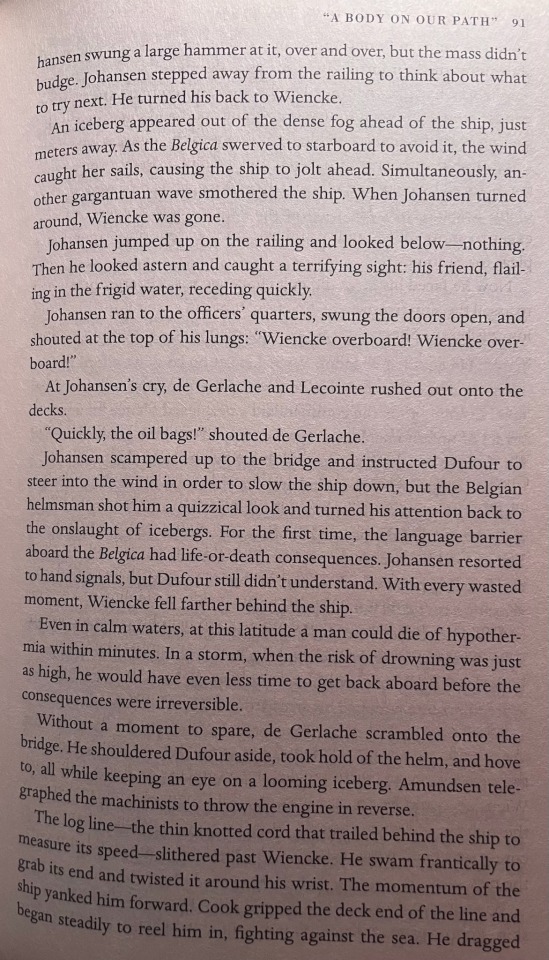
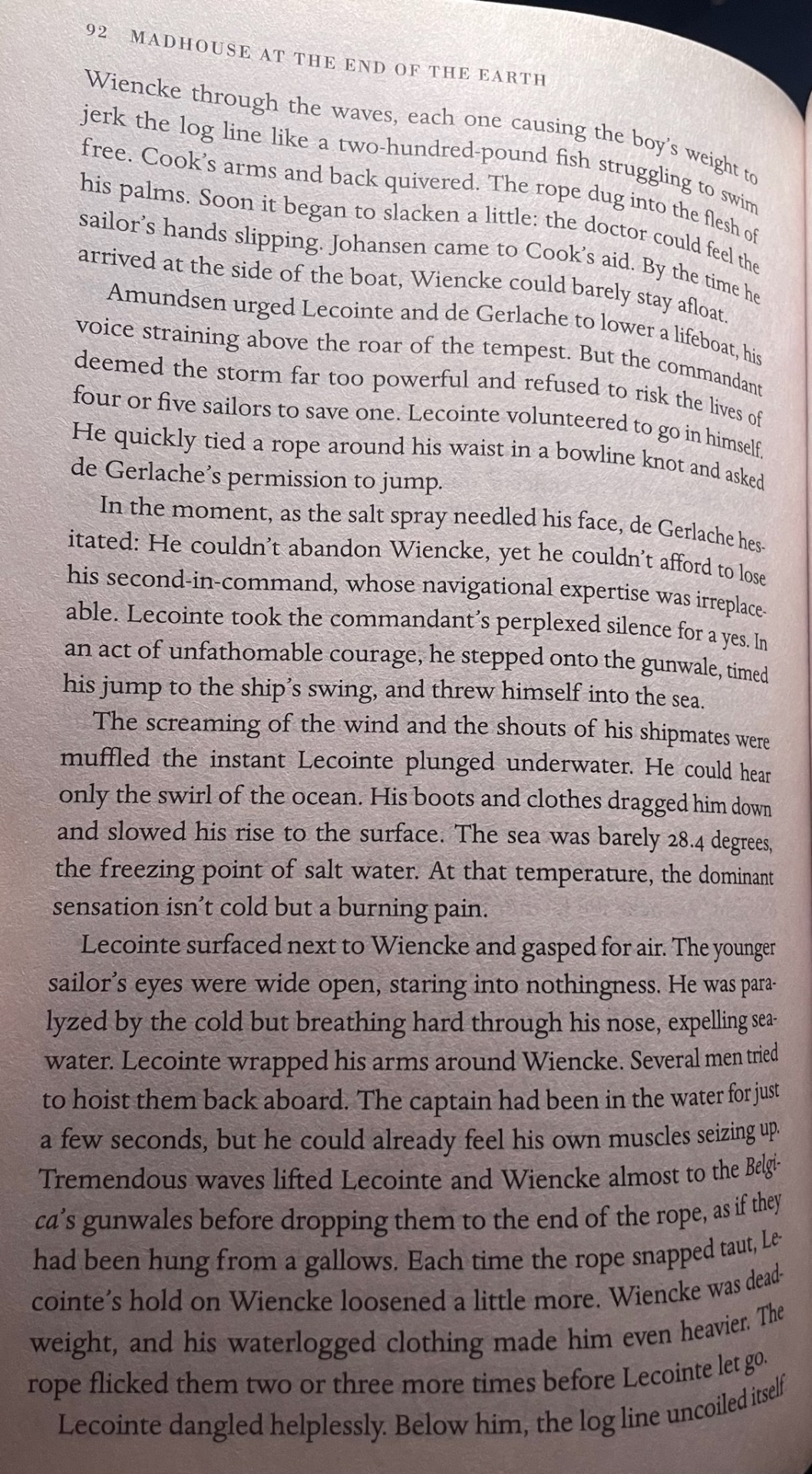
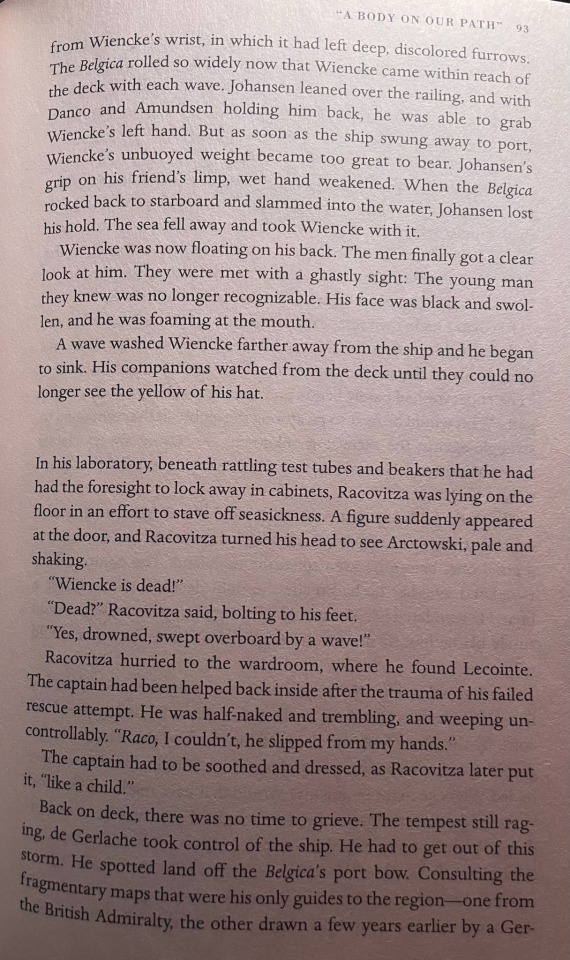

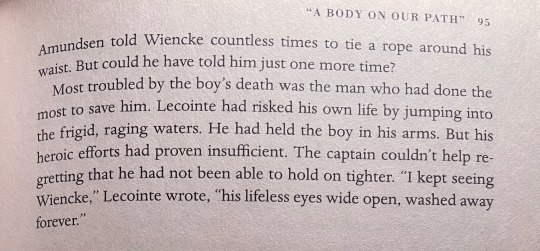
Through the First Antarctic Night by Frederick A. Cook:
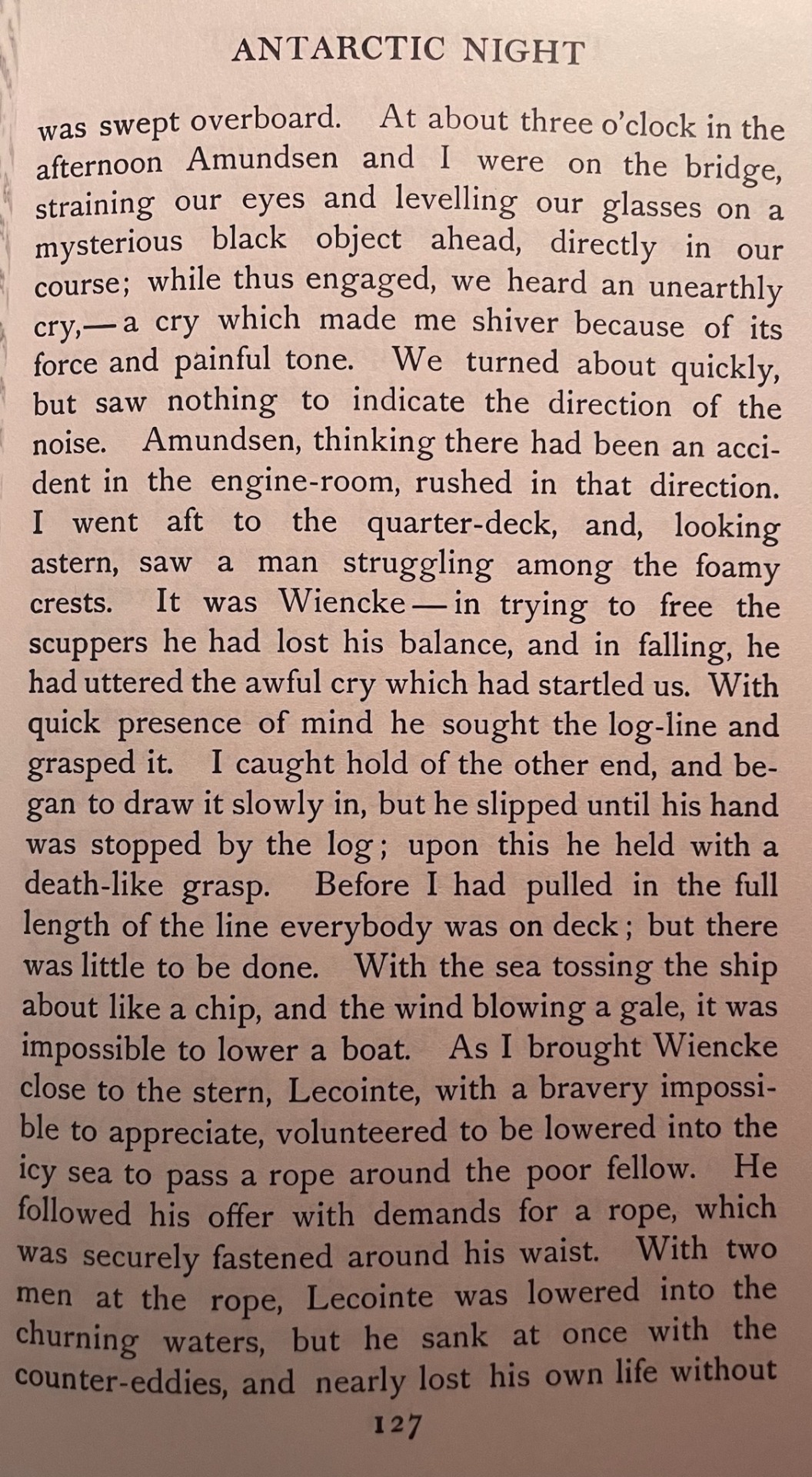

In the Land of the Penguins by Georges Lecointe:



This is all I have so far, but if anyone else has access to any of the other accounts and would like to add to this I’ll love you forever <3
#belgica expedition#polar exploration#i’ll happily return the favor with any scenes that i can supply from the books i have#madhouse at the end of the earth#through the first Antarctic night#in the land of the penguins#georges lecointe#frederick cook#roald amundsen#wienke#august wienke#adrien de gerlache#henryk arctowski#emil racovitza#polar explorers#books#polar history#primary sources#i love primary sources#i love reading through all the different accounts#wanted to put these together#i’m working on something#please Julian Sancton where did you get that part about sopping wet Lecointe being comforted by Racovitza?#tell me more#i love pathetic men#this is genuinely one of my favorite chapters of the entire book#it’s so dramatic and tragic#it’s also when i decided that Lecointe was my favorite
29 notes
·
View notes
Text

extremely silly belgica pacific rim AU drawn shortly after reading madhouse at the end of the earth for the first time aaallll the way back in early 2022. you can tell it was early days because i was still trying to get the hang of roald and he's way too hot here
'ireny is roald's and fred's jaeger just a cone' yeah it is
guys who are drift compatible: fred and roald, raco and artocho, danco and lecointe
guys who can't drift: melaerts
#frederick cook#roald amundsen#henryk arctowski#emil racovitza#emil racoviță#georges lecointe#belgica#belgica expedition#polar exploration#madhouse at the end of the earth#my first thought was 'is this too weird to post on main' and then i remembered julian sancton has seen it already. so
57 notes
·
View notes
Text
belgica tv show save me. save me belgica tv show
#i need this in my life#everyone say thank you julian -rpf is fine- sancton#the blood drinking scene.#the wiencke arc….#the amundsen de gerlache fight#does anyone hear me. is this thing on.#polar exploration#madhouse at the end of the earth#belgica
41 notes
·
View notes
Text
finally reading madhouse at the end of the earth and waow no one was exaggerating when they said that cookmundsen is so real...roald full-on giggling and twirling his hair and kicking his feet whenever he saw cook in his sealskin fit. whenever cook did literally anything
#julian sancton no.1 polar explorer RPF warrior#this moment where they're climbing that mountain for literally no good reason. that's romance. sorry#also apologies to my new extremely cool mutuals. i promise i can talk and post about things other than polar explorer yaoi#polar exploration
17 notes
·
View notes
Text
I don't even know the time schedule for terror camp. or the timezone
7 notes
·
View notes
Text
it was beautiful to miss terror camp events now i have unlimited entertainment to watch while i eat
#computer! show me julian sancton again#entertainment options are always anthony bourdain (bad because then i wish i was eating what he was eating) or this now
5 notes
·
View notes
Note
i love voting for what i think is the blatantly obvious choice in these arctic hottie polls just based on looks and then i scroll down an inch farther and see you campaigning your heart out for the ugly one (JOKE JOKE JOKE JOKE)
and what about it
#replies.txt#Anonymous#if this is about raco i have it on EXTREMELY good authority (julian sancton) that he was a sick bitch who liked freak sex#we STAN a kinky peepaw
2 notes
·
View notes
Text
begging all my followers who are not yet polarpilled to look up frederick cook. no I can't give you any context it's funnier if you go in blind enjoy ❤️
5 notes
·
View notes
Text
ALFRED LANSING ENDURANCE YOU WILL ALWAYS BE FAMOUS
Listening to a non-fiction book about maritime disaster and the way this author is describing the ship sinking is so sexual
#if you like this sort of thing you may also enjoy madhouse at the end of the earth by julian sancton#+ the ship beneath the ice by mensun bound
43K notes
·
View notes
Text
Sunday keynote starting now!

Join us now on Zoom as we hear from Julian Sancton, author of Madhouse at the End of the Earth, which chronicles the mayhem that unfolded during the Belgica Antarctic Expedition.
Follow us on Twitter for live updates from the conference! ❄️
39 notes
·
View notes
Note
do you have any book (or other media) recommendations for someone looking to go completely insane about arctic exploration now that they've finally caved and watched the terror after holding strong since 2020? i'd love to dive more into the franklin expedition and especially fitzjames and crozier but i'm also very interested in this cherry dude you've been posting about recently.
NONNY OF COURSE I DO. the last time i got an ask like this was over 2 years ago, so i am eager to deliver a refined version of my POLAR FLOWCHART...
SO YOU JUST WATCHED THE TERROR. AND NOW YOU WANT TO READ BOOKS.
A) Do you want to read more about the Franklin Expedition specifically?
If YES, go to B.
If NO, I'M OPEN TO WHATEVER, go to C.
B) Do you care about super detailed historical accuracy or do you just want a fun breezy intro book? Alternatively do you like ice mummies?
If YOU ARE KIND OF A STICKLER, go to D.
If YOU JUST WANNA VIBE AND LEARN THE BASICS, go to E.
If YOU WANT THE FUCKING ICE MUMMIES, go to F.
C) Do you want another story where people die and are sad and fucked up but also hold each other and experience intimacy in extremis?
If NO, YOU KIND OF WOULD RATHER HAVE AN UPLIFTING ONE THIS TIME, go to G.
If YOU DEFINITELY JUST WANT MORE POLAR MISERY, go to H.
D) Would you rather learn more about what happened before the expedition or what happened during/after?
If you want the JANKY FRANKLIN SHITSHOW PREQUEL, try The Man Who Ate His Boots by Anthony Brandt.
If you want the AMBIGUOUS HORROR OF DYING WHITE MEN INVADING A LAND THAT ISN'T THEIRS, try Unraveling the Franklin Expedition by David C. Woodman.
E) Would you rather have a polar-specific overview or a more general book on exploration history of the era that includes polar stuff?
If you want ICY BOYS ONLY, try Erebus: The Story of a Ship by Michael Palin.
If you want to read about GUYS HAVING A BAD TIME IN HOT PLACES TOO, try Barrow's Boys by Fergus Fleming or James Fitzjames: The Mystery Man of the Franklin Expedition by William Battersby.
F) STRONG AS FUCK ICE MUMMY MONDAY
The ONE YOU WANT IS Frozen In Time by Owen Beattie and John Geiger.
G) Is your vibe more "the power of friendship and brotherhood to overcome immense challenges" or "worst fucking rich boy gap year of all time" ?
If you want to be stirred by fine leadership qualities and hope against all odds, try Endurance by Alfred Lansing.
If you want to be entertained by awful leadership qualities and deranged crew antics, try Madhouse at the End of the Earth by Julian Sancton.
H) Would you want your dead heroes to be beloved and valorized or ignored and forgotten?
If you're all in on posthumous legends, try A First Rate Tragedy by Diana Preston or The Worst Journey In The World by Apsley Cherry-Garrard.
If you want to be one of the only ones who care, try The Lost Men by Kelly Tyler-Lewis.
BONUS RECS
If you want to know about ghosts, mediums, and the psychic ghost child Little Weesy who is one of the most legendary Franklin-adjacent curiosities: The Spectral Arctic by Shane McCorristine
Either before or after you read Worst Journey (before might be better if the full book intimidates you, but only if you've prepped with the Preston): the Worst Journey In The World graphic novel by Sarah Airriess
For after you have loaded up on Franklin and Terra Nova lore (the book doesn't hit as hard without deep emotional attachment to both imho): I May Be Some Time: Ice and the English Imagination by Francis Spufford
If you need to know more about the Discovery expedition-era Toxic Polycule (Scott/Shackleton/Wilson): Shackleton's Forgotten Expedition by Beau Riffenburgh
(very selfish recommendation motivated by wanting more people to care about him) If you want vivid detail on the day-to-day life of the Terra Nova expedition: With Scott: The Silver Lining by T. Griffith Taylor
and lastly but CERTAINLY not least:
If you are "very interested in this cherry dude i've been posting about recently" and have prepped with the Preston and/or WJ: Cherry by Sara Wheeler ... then you will understand.
370 notes
·
View notes
Text
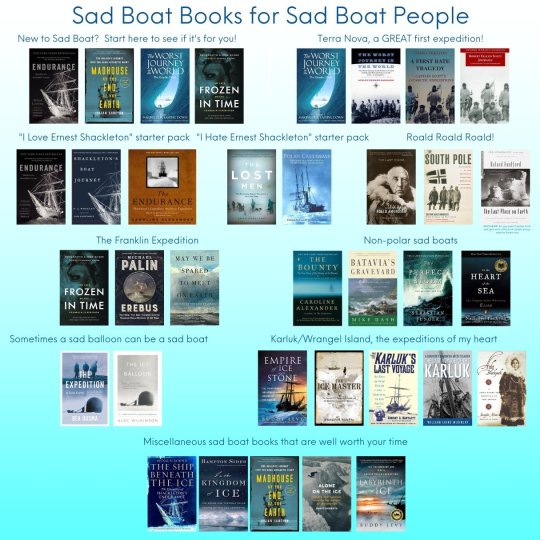
I guess it's time to start moving some content from twt over here! For those who don't know me, I'm a public librarian with a special interest in polar and nautical history, and I love nothing more than connecting readers with good books. I've managed to convert some friends to my way of thinking, and one of them coined the phrase "sad boat books" to describe the types of books that I'm always reading and recommending. Here is my first list of sad boat books-- I can personally vouch for all of them!
New to sad boat? Start here to see if it’s for you!
Endurance by Alfred Lansing
Madhouse at the End of the Earth by Julian Sancton
The Worst Journey in the World- The Graphic Novel Volume 1: Making Our Easting Down adapted by Sarah Airriess from the book by Apsley Cherry-Garrard
Frozen in Time: The Fate of the Franklin Expedition by Owen Beattie and John Geiger
Terra Nova, A GREAT first expedition!
The Worst Journey in the World- The Graphic Novel Volume 1: Making Our Easting Down adapted by Sarah Airriess from the book by Apsley Cherry-Garrard
The Worst Journey in the World by Apsley Cherry-Garrard
A First Rate Tragedy by Diana Preston
Robert Falcon Scott Journals- Captain Scott’s Last Expedition by Robert Falcon Scott
“I Love Ernest Shackleton” starter pack
Endurance by Alfred Lansing
Shackleton’s Boat Journey by Frank Worsley
The Endurance by Caroline Alexander
“I Hate Ernest Shackleton” starter pack
The Lost Men by Kelly Tyler-Lewis
Polar Castaways by Richard McElrea and David Harrowfield
Roald Roald Roald!
The Last Viking: The Life of Roald Amundsen by Stephen Bown
The South Pole by Roald Amundsen
The Last Place on Earth by Roland Huntford*
*DISCLAIMER: this guy hates Captain Scott and gets most of the Scott details wrong, read for Roald only!
The Franklin Expedition
Frozen in Time: The Fate of the Franklin Expedition by Owen Beattie and John Geiger
Erebus by Michael Palin
May We Be Spared to Meet on Earth: Letters of the Lost Franklin Expedition edited by Russell A. Potter, Regina Koellner, Peter Carney, and Mary Williamson
Non-polar sad boats
The Bounty by Caroline Alexander
Batavia’s Graveyard by Mike Dash
The Perfect Storm by Sebastian Junger
In The Heart of the Sea by Nathaniel Philbrick
Sometimes a sad balloon can be a sad boat
The Expedition by Bea Uusma
The Ice Balloon by Alec Wilkinson
Karluk/Wrangel Island, the expeditions of my heart
Empire of Ice and Stone: The Disastrous and Heroic Voyage of the Karluk by Buddy Levy
The Ice Master by Jennifer Niven
The Karluk’s Last Voyage by Robert A. Bartlett
The Last Voyage of the Karluk: A Survivor’s Memoir of Arctic Disaster by William Laird McKinlay
Ada Blackjack: A True Story of Survival in the Arctic by Jennifer Niven
Miscellaneous sad boat books that are well worth your time
The Ship Beneath the Ice: The Discovery of Shackleton’s Endurance by Mensun Bound
In The Kingdom of Ice: The Grand and Terrible Polar Voyage of the USS Jeannette by Hampton Sides
Madhouse at the End of the Earth by Julian Sancton
Alone on the Ice: The Greatest Survival Story in the History of Exploration by David Roberts
Labyrinth of Ice: The Triumphant and Tragic Greely Polar Expedition by Buddy Levy
If you read and enjoy any of these, please let me know!
2K notes
·
View notes
Text
i think they should double down on. stop tip toeing around it, cowards. start including blatant pornography in the middle of your nonfiction polar exploration books.
i have a theory that every single dude writing about polar exploration wants to fuck at least one of those men. stop calling amundsen strapping stop talking about how tough and manly john rae was and stop describing shackleton like you’re in a romance novel. what’s wrong with you.
474 notes
·
View notes
Text

Oh i’m sure
(Madhouse at the End of the Earth by Julian Sancton, p.149)
118 notes
·
View notes